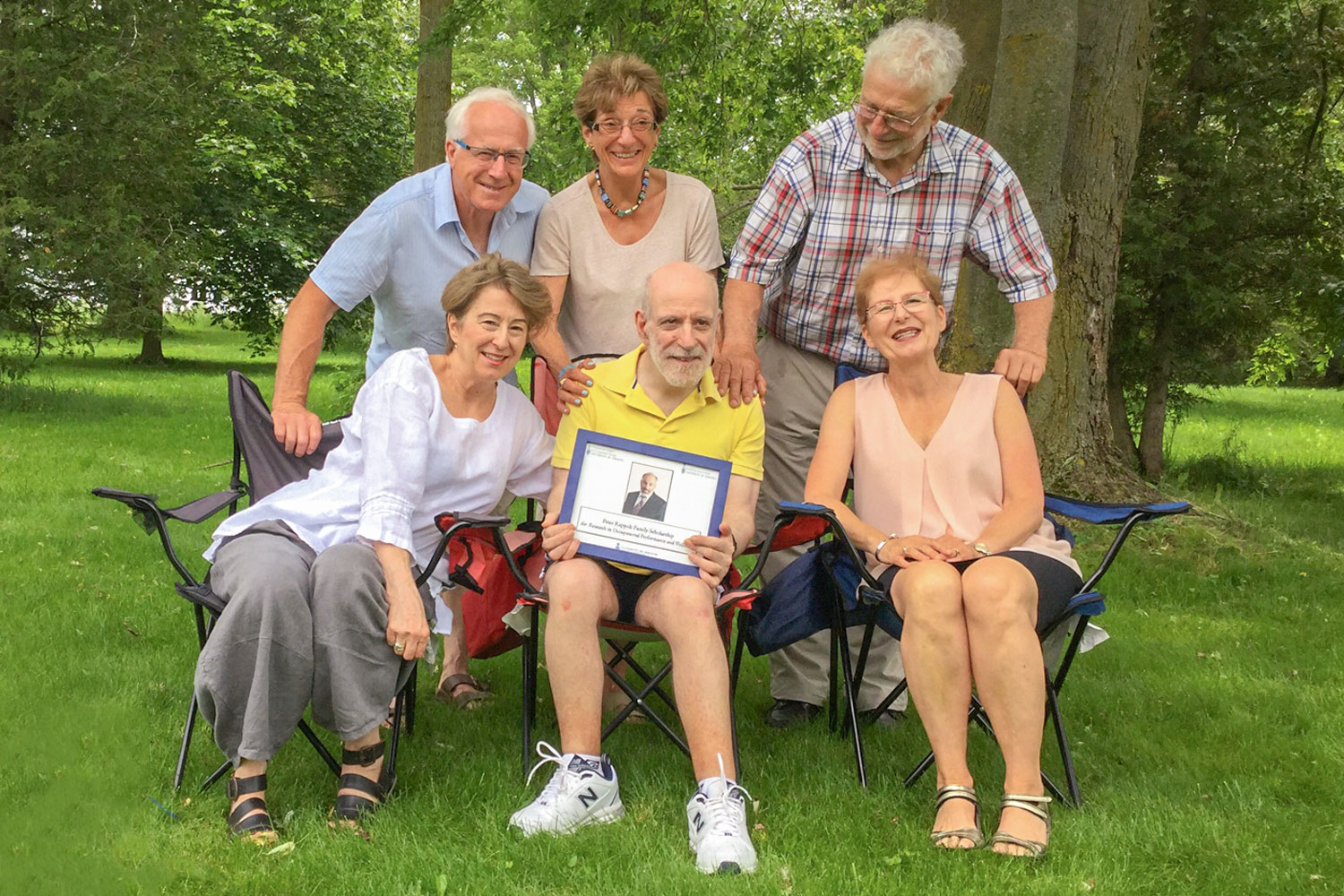Siblings honour brother: scholarships in occupational science and therapy
 Featured Image Caption
Featured Image Caption
The Rappolt siblings are funding two scholarships at U of T — aimed at improving care and access to services for people like their brother Peter, who has developmental delay and a mental health disorder.
Posted on January 31, 2018
If you focused on what Peter Rappolt could do, you might spot him joking with his nieces and nephews at a family baseball game, poking fun at one of his five siblings, or strutting his stuff at the bowling alley. You might also marvel at his insight when he asks how you are feeling when no one else senses you’re down.
With his dual diagnosis, however—developmental delay paired with schizoid affective disorder—it has often been easier to see what Peter can’t do. In his late 50s, he is unable to read or write, drive a car or live independently. And while he has spent much of his life in caring and supportive assisted living facilities, he has at other times fallen into gaps between hospital and community care.
Over the past 25 years, the Rappolt siblings have worked together to navigate health care and community services for their brother. And now, the Rappolt siblings have come together to make two gifts, worth a combined $250,000 including matching funding, to create student scholarships in the Faculty of Medicine. The two scholarships are in Peter’s name, and are aimed at building research capacity to improve systems of care for people like Peter.
Helping others by making sure help is easy to find…and use
Gail (executive coach and retired high school principal), Paul (contractor and award-winning caregiver), Bob (mining engineering consultant), Susan (occupational therapist and academic at U of T) and Marg (former deputy minister in the Ontario government), are in constant communication with each other about Peter’s care needs, working to bring some joy into his life.
Gail Rappolt comments that despite their commitment to Peter’s well-being, as well as some wonderful, caring doctors and amazing support from community living staff, “it’s been so frustrating at certain points, especially at the systemic level.” She recalls finding Peter on an acute care ward with a suspected stroke, unable to eat or drink—and yet shockingly, without an IV. Like so many others families, the Rappolts have struggled to find appropriate living arrangements for Peter following his discharge from hospital.
“We think, if all of us with our combined efforts can’t figure out how to get Pete the care he needs,” says Gail, “then what about people trying to navigate this system on their own? Or caregivers who don’t speak English, or have disabilities themselves?”
Scholarships support students researching occupational therapy and health system best practices
The Rappolt’s first gift will fund a scholarship, in perpetuity, for a PhD student at the Rehabilitation Sciences Institute. The second gift will create a research fund for projects by students doing a master of science in occupational therapy.
Both awards will support new research in occupational science and occupational therapy focused on mental health, developmental delay, caregiving, community integration, cognitive assessments and interventions, environmental adaptations, translating research evidence into practice, or examining how the health and social systems can meet individuals’ complex needs.
“Just as we’ve tried to create an environment that allows Peter to enjoy life as much as he possibly can, this field looks at the whole person and the system around that person,” says Susan Rappolt, Chair of U of T’s Department of Occupational Science & Occupational Therapy.
“This gift recognizes the crucial but often under-recognized role of occupational therapy and the rehabilitation sector overall—in mental health and complex conditions,” says Angela Colantonio, Director of the Rehabilitation Sciences Institute, where doctoral stream students receive their training. “The client-centred approach that occupational therapists and other rehab professionals champion is so important in ensuring patient goals and priorities are addressed.”
These scholarships are a fitting legacy for Peter, who is loved by his family and admired by many for his courage, kindnesses, and stamina. “We’re hoping that some good can come from Peter’s experiences,” says Gail, “that will make it possible to improve life for people facing similar complex challenges.”
